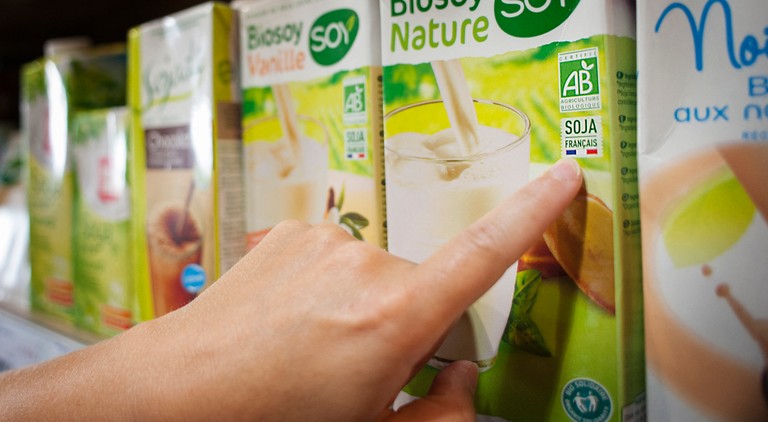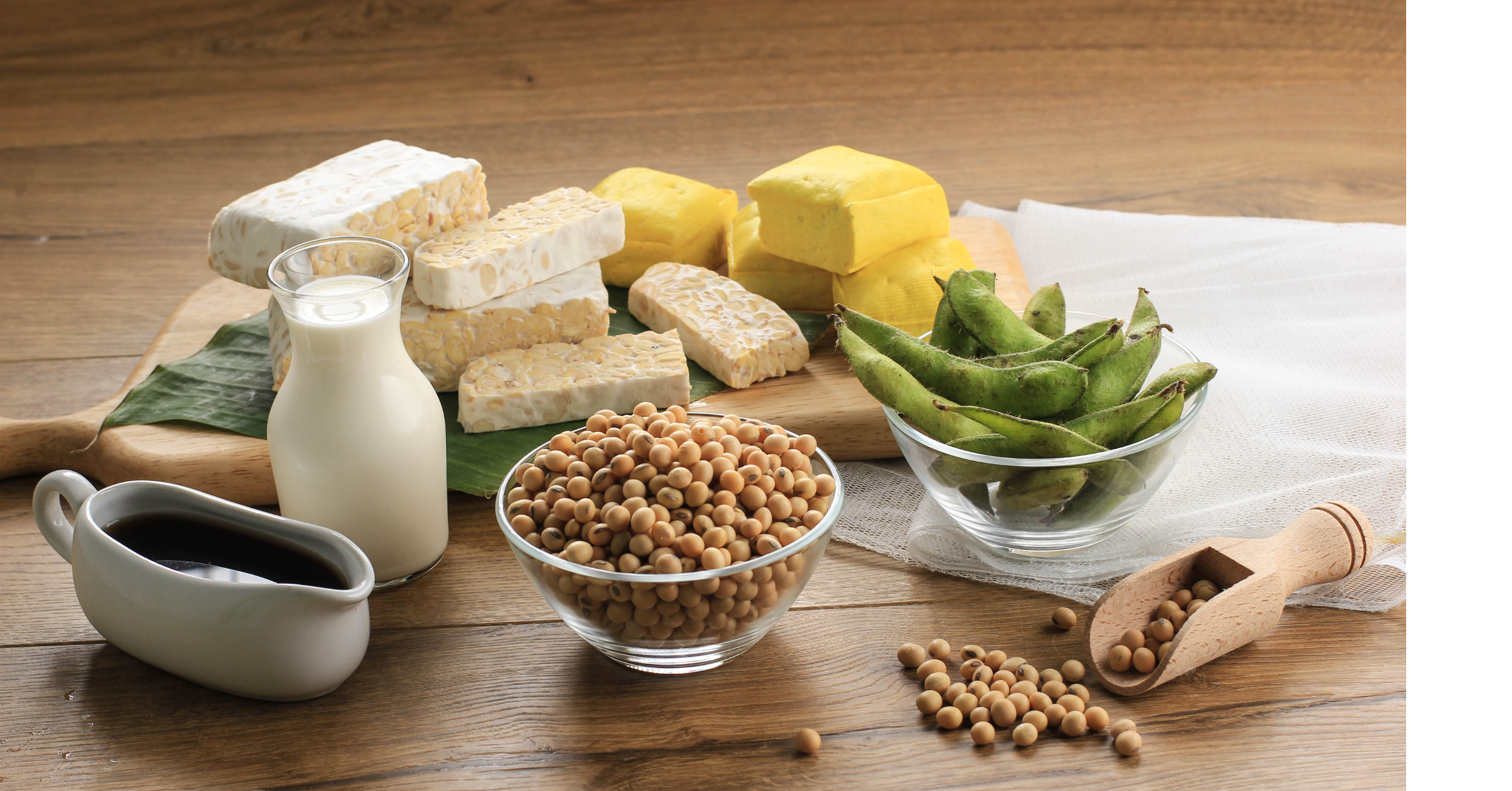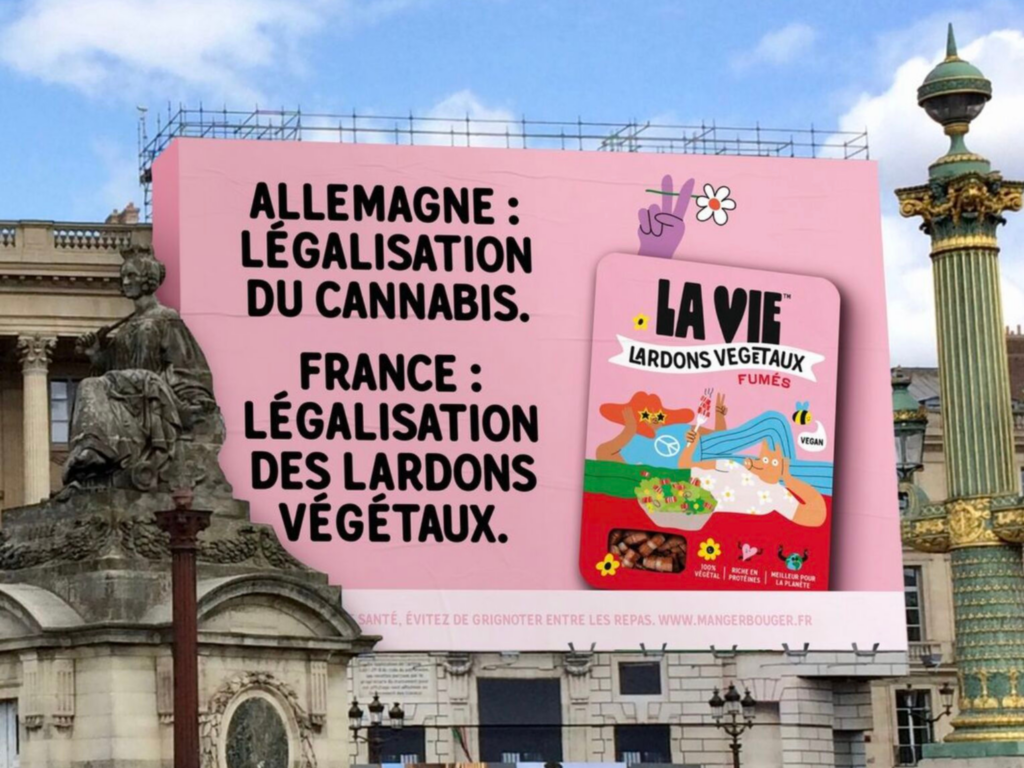Au Revoir, Soja?: French Food Safety Agency Calls for Ban on Soy Products in Schools
5 Mins Read
France’s food safety agency has recommended a ban on soy-based products in mass catering, raising concerns that have been long debunked and go against scientific consensus.
After attempting to ban cultivated meat, France could be coming for your tofu too.
The French Agency for Food, Environmental, and Occupational Health Safety (ANSES), which oversees food safety in the country, has advised mass catering environments like schools, corporate cafeterias, and daycare facilities to stop serving soy products.
The decision is based on the agency’s assessment of health risks linked to the consumption of foods rich in isoflavones, which are essentially plant-derived phytoestrogens.
While these polyphenols are found in many foods, such as chickpeas, fava beans and pistachios, their main source is soy. These molecules are known for their oestrogenic hormonal activity, and can harm the reproductive system if consumed excessively, according to ANSES.
This debate has surrounded soy for a long time, but studies suggest that neither soy nor isoflavone intake affects reproductive hormones. Environmental organisations are hitting back at the ANSES’s recommendations, given soy’s established health and environmental benefits, and EU-wide efforts to diversify protein sources.
Why is the ANSES asking caterers to remove soy?

To reach its conclusion, ANSES defined toxicological reference values (TRVs) – essentially, how much isoflavone content you can consume daily without risking ill health effects. The agency settled on 20 micrograms per kg of body weight for the general population and half as much for vulnerable populations (pregnant women, those of reproductive age, and children before puberty).
At these levels, it is impossible to eat soy products without passing the isoflavone threshold, especially if you’re vegan and use soy as a source of complete protein. For example, this would mean a child weighing 30kg could only drink 3 ml of soy milk every day, while a woman weighing 68kg could only consume a glass of soy milk once every 48 days.
So it should come as no surprise that 76% of French children aged three to five exceed the TRV, as do 47% of adults aged 18 to 50. For women over the age of 51, this rises to 75%. All babies fed with soy-based formulas exceed the isoflavone limit set by ANSES.
It’s why ANSES is recommending a ban on soy products in catering settings. That said, it does recognise the benefits of soy – it’s been shown to reduce risks of cardiovascular disease, stroke, and some cancers while improving bone health and alleviating menopausal symptoms.
In addition to the ban, ANSES suggests reducing the isoflavone content of soy, which it feels is “necessary and possible”. This, it says, is dependent on the soy variety, growing conditions, the plant’s maturity, as well as the manufacturing processes and recipe formulation. ANSES is asking producers to “implement agronomic techniques and manufacturing processes” to produce foods “while controlling isoflavone content”.
Here’s the thing, though. A cup of soy milk or a standard 100g serving of tofu contains around 25 mg of isoflavones. So for a 75 kg man in France (about the national average), this would exceed the ANSES consumption limit by 17 times.
Rafael Pinto, senior policy manager at the European Vegetarian Union, called the move a “scare tactic to push consumers away from plant-based alternatives”. “The medical community needs to debunk this fear-mongering and set the record straight,” he remarked.
The truth about soy, isoflavones, and health

Pinto noted that the ANSES recommendation “defies the scientific consensus”. A host of studies have found soy products to have no health risks related to isoflavones and oestrogen.
In 2021, a review of 417 reports based on human isoflavone intake and endocrine-related health outcomes noted that these concerns are largely based on animal studies and do not reflect human biology. It found that isoflavone consumption does not adversely affect thyroid function, oestrogen levels, ovulation in women, or testosterone levels in men.
This followed a 2020 analysis of 41 studies, which concluded that “neither soy nor isoflavone intake affects [the] male reproductive hormone”.
Just this year, another systematic review of 40 trials (funded by the US soy checkoff programme) found that soy isoflavones don’t affect measures of oestrogenicity. In fact, isoflavones from soy products could have additional health benefits due to the bioactive components found in them.
In line with ANSES’s advice, this study suggested that foods made from condensed soy sources, like soy protein isolates or concentrates, can contain up to 90% fewer isoflavones.
Other public agencies have also concluded that soybeans and their products are safe. For example, the European Food Safety Authority (EFSA) identified no harmful effects of soy isoflavones in the thyroid, uterus and breasts of menopausal women in its review.
On the other side of the Atlantic, the US’s National Institutes of Health (NIH) has qualified soy as a safe food too, citing research that shows soy isoflavones could lower the frequency and severity of menopausal hot flashes and possibly have a beneficial impact on postmenopausal bone health.
“We are surprised by the ANSES recommendation to exclude soya-based foods from institutional catering despite their well-documented health and environmental benefits,” said Anna-Lena Klapp, head of research at food awareness organisation at ProVeg International. “We would like to see large-scale meta-analyses that support this recommendation, which stands in contrast to national dietary guidelines in many countries.”
France’s continued attacks on alternative proteins

ANSES’s move is antithetical to Europe’s efforts to encourage plant protein consumption. Countries like Germany, Austria, Finland and Norway have all revised their dietary guidelines in favour of plant proteins. Further, the upcoming US dietary recommendations are set to list soy products above animal foods as a source of protein.
This is far from the first time France is in the crosshairs of plant-based critics. In 2023, the country’s then-agriculture minister promoted factory-farmed meat, around the same time it attempted to ban cultivated meat.
The nation has also tried to impose a labelling ban on plant-based meat – in direct opposition to EU law – twice, with the most recent attempt being rejected by both the national Conseil d’État and the European Court of Justice.
The former, France’s top court, called the government’s proposed decrees “illegal and contrary to European regulation”, noting that EU member states cannot independently regulate food labelling.
ProVeg pointed to the WHO’s classification of processed meat as a carcinogen and red meat as a likely carcinogen, questioning why the French health agency hasn’t made a comparable recommendation for these foods. “ANSES reported on this itself but has not made a recommendation to remove it from mass catering,” it said.



